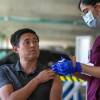COVID-19 infections are on the rise again in Massachusetts, on top of flu and RSV cases.
And nearly four years after the world was seemingly brought to a halt by the coronavirus, changing guidelines and new strains can make it confusing to know how best to avoid infection and what to do if your rapid test shows two lines. We asked two of the state's top public health officials to answer those common questions.
How prevalent is COVID in Massachusetts right now?
Wastewater continues to be one of the most reliable indicators of COVID-19 levels in the community. And as of late December 2023, it's not looking great.
"The concentration of COVID-19 in our local wastewater samples here in Boston is very high, and it's continuing to increase," said Dr. Bisola Ojikutu, Boston's commissioner of public health and executive director of the Boston Public Health Commission. "Over the course of the last two weeks, we've noted about a 23% increase in our Boston samples."
Another key metric that public health officials focus on is hospitalization rates.
"Our hospitals are packed to the gills right now," said Dr. Larry Madoff, medical director of the Bureau of Infectious Disease and Lab Sciences for the state Department of Public Health. "Our hospitals are at or above capacity and there's waiting times in emergency departments."
This week, 16.7% of emergency room visits in the state were due to respiratory virus infections.
"That's high," Madoff said. "That's as high as we've seen it this season."
So how do I avoid getting sick?
One of the most important things you can do to protect yourself is to make sure you're up to date with COVID-19 vaccinations.
It's probably also good idea to put on a mask.
"I know that most people obviously are not wearing masks," Ojikutu said. "However, masking is an important strategy that reduces the spread of respiratory viruses and can do so effectively if you mask appropriately when you are in crowded spaces."
Do I really need to get another shot?
Probably, yes!
Statewide, just 18.1% of Massachusetts residents have received the latest COVID-19 booster.
"If you haven't been vaccinated since late August of 2023, then you haven't gotten the updated vaccine," Madoff said.
In Boston, free vaccine clinics are available at the Bruce C. Bolling Building in Roxbury and at City Hall. More information is online here. Other vaccine locations can be found here.
What are the new COVID variants?
One big reason to get a shot: The updated vaccine is protective against newer variants of the virus, Madoff explained.
"The one that's increasing the fastest is one that's called JN.1," he said. "Now, all of these variants are closely related to omicron that's been with us. And that's good news because the updated vaccine continues to protect against these variants."
JN.1 currently accounts for 44% of all COVID-19 cases in the United States. There remains limited data about this variant because it's so new, but the World Health Organization says it may be more capable than prior variants of evading previous immunity. Importantly, WHO does not have reason to believe this variant has a higher risk of causing severe disease.
Other common circulating variants are HV.1 and EG.5 — also omicron relatives — though each is progressively accounting for fewer cases as JN.1 spreads.
Where can I get COVID tests?
Rapid antigen tests are available at most pharmacies, but are no longer covered by most insurance plans.
All households in the United States are eligible for another four free at-home tests from the federal government. The online form to order those free tests is here.
If I do test positive, how long do I have to isolate?
Those first five days are essential to stopping the spread of the virus to others around you.
"And that means staying at home, if at all possible, and wearing a mask around household members," Ojikutu said.
Many people will continue to test positive after those initial five days. Even so, after then, if you have no symptoms or your symptoms are improving, CDC guidelines suggest you can end isolation.
Until day 11, you should continue to wear a mask when around others indoors and in public.
"[However], if someone tests negative on two separate at home tests taken approximately 48 hours apart, you can certainly remove the mask before day ten," Ojikutu said.
What treatments are available for COVID?
If you are at least 50 years old or have an underlying health issue, you can be prescribed the antiviral treatment Paxlovid.
"Paxlovid is a very effective treatment," Ojikutu said. "It has almost a 90% reduction in risk of hospitalization and death in unvaccinated people in a clinical trial that was performed by the NIH."
COVID-positive patients can speak to their doctor about whether they should get a Paxlovid prescription, or get a free telehealth consultation from the state Department of Public Health.
Some patients might be frustrated that they don't qualify for a prescription for the antiviral treatment. Madoff says there's a reason it's not prescribed to everyone.
"The purpose of Paxlovid and the other antiviral treatments is not to make the illness go away, but it's to keep you out of the hospital and keep you from dying of the illness," he said. "And that's what it's been shown to do. And that benefit is really only to those who are at high risk of developing those complications."








